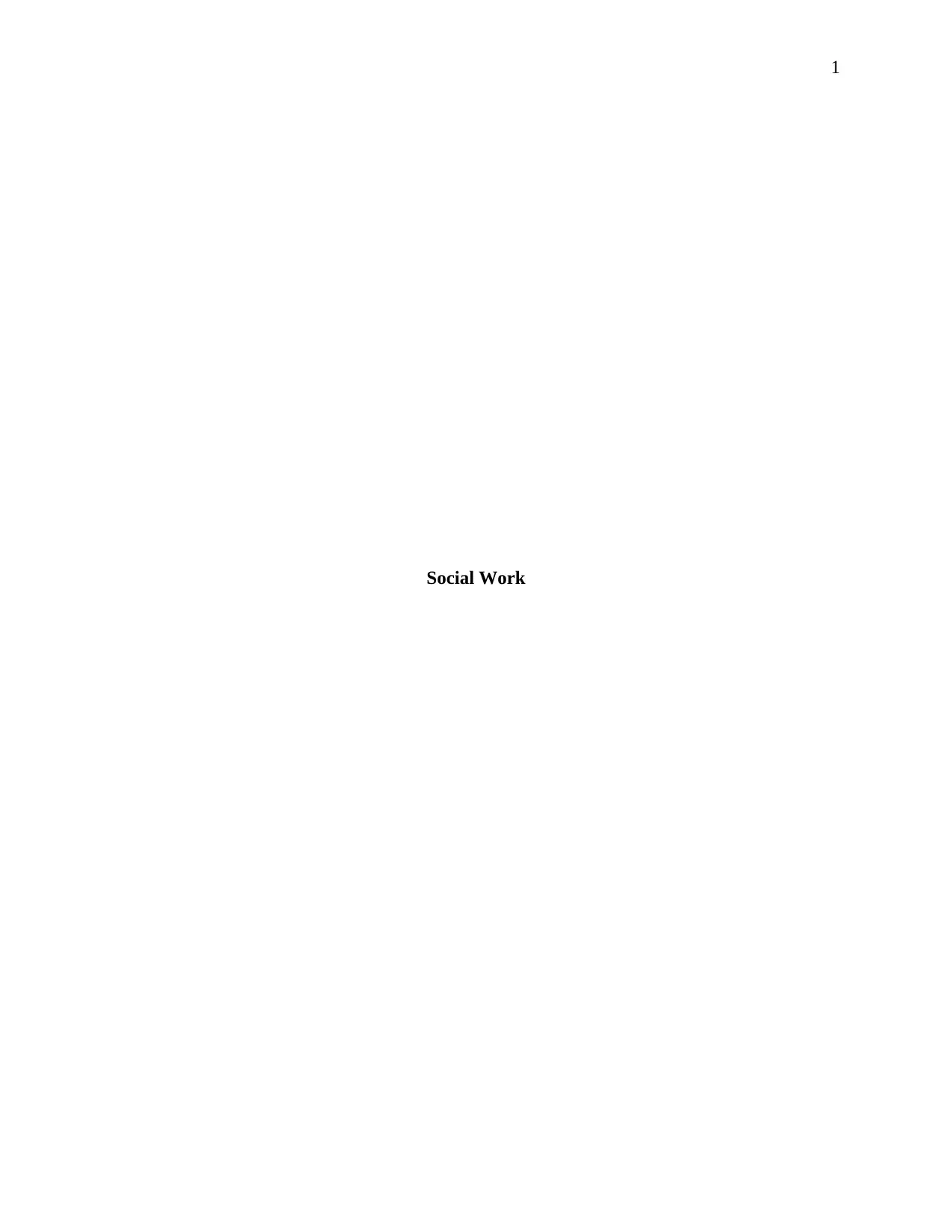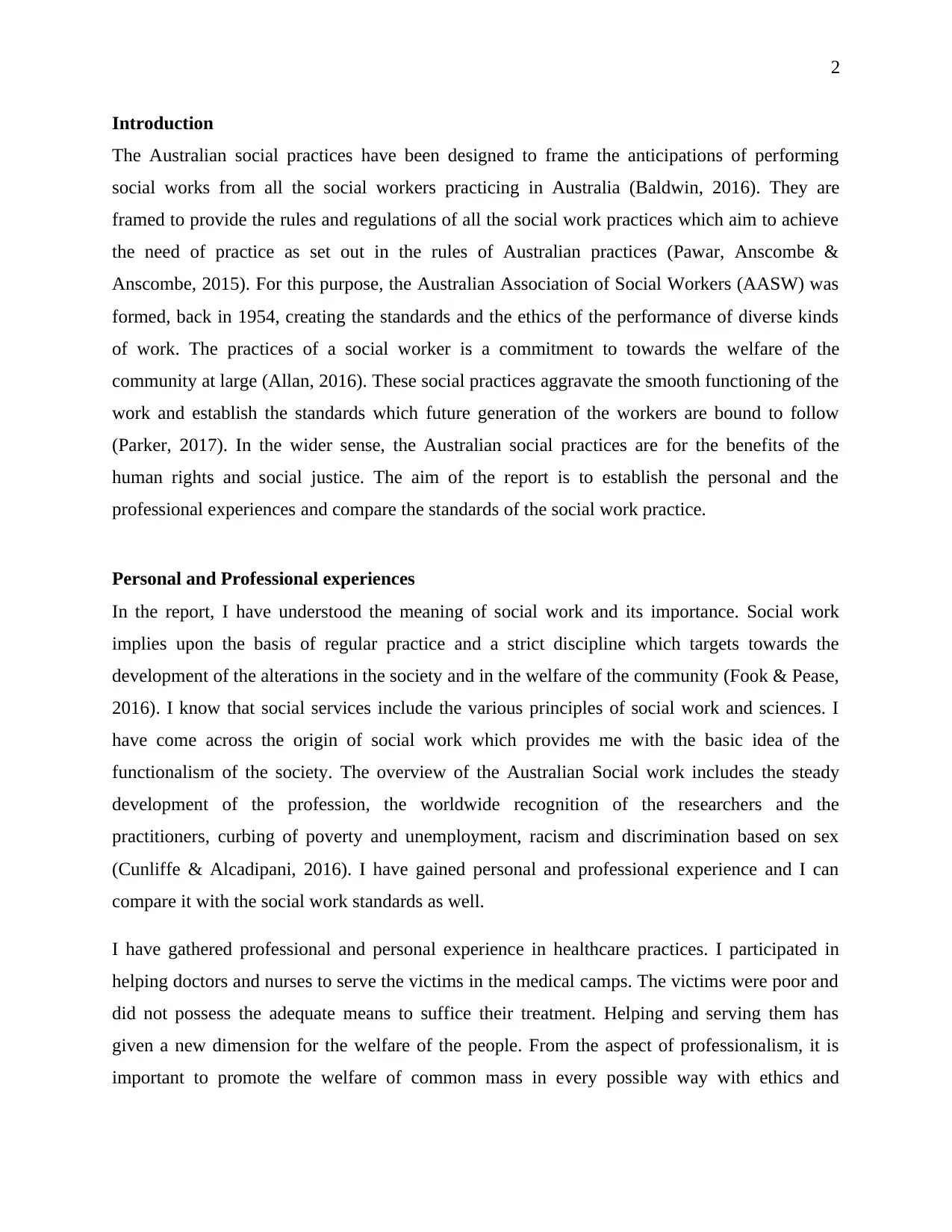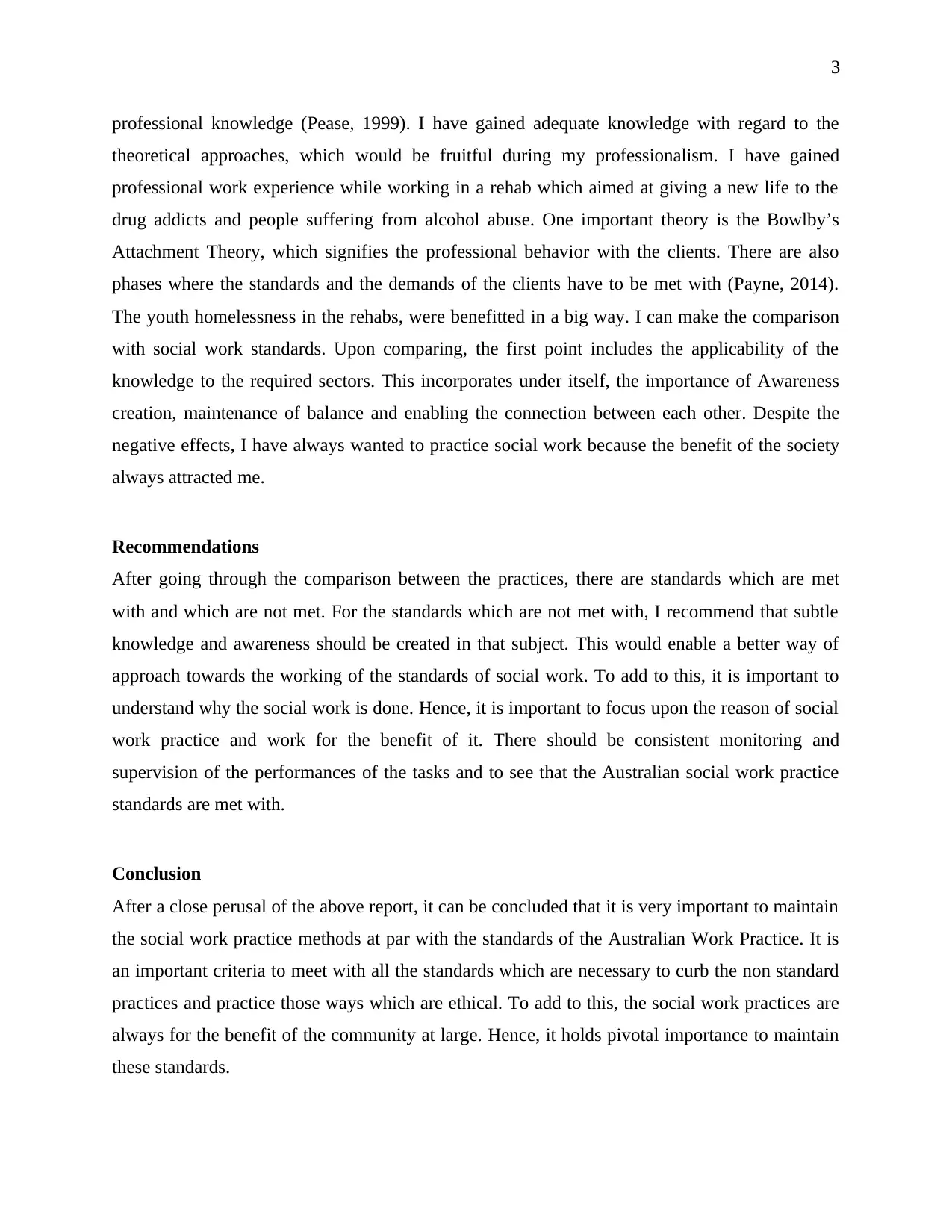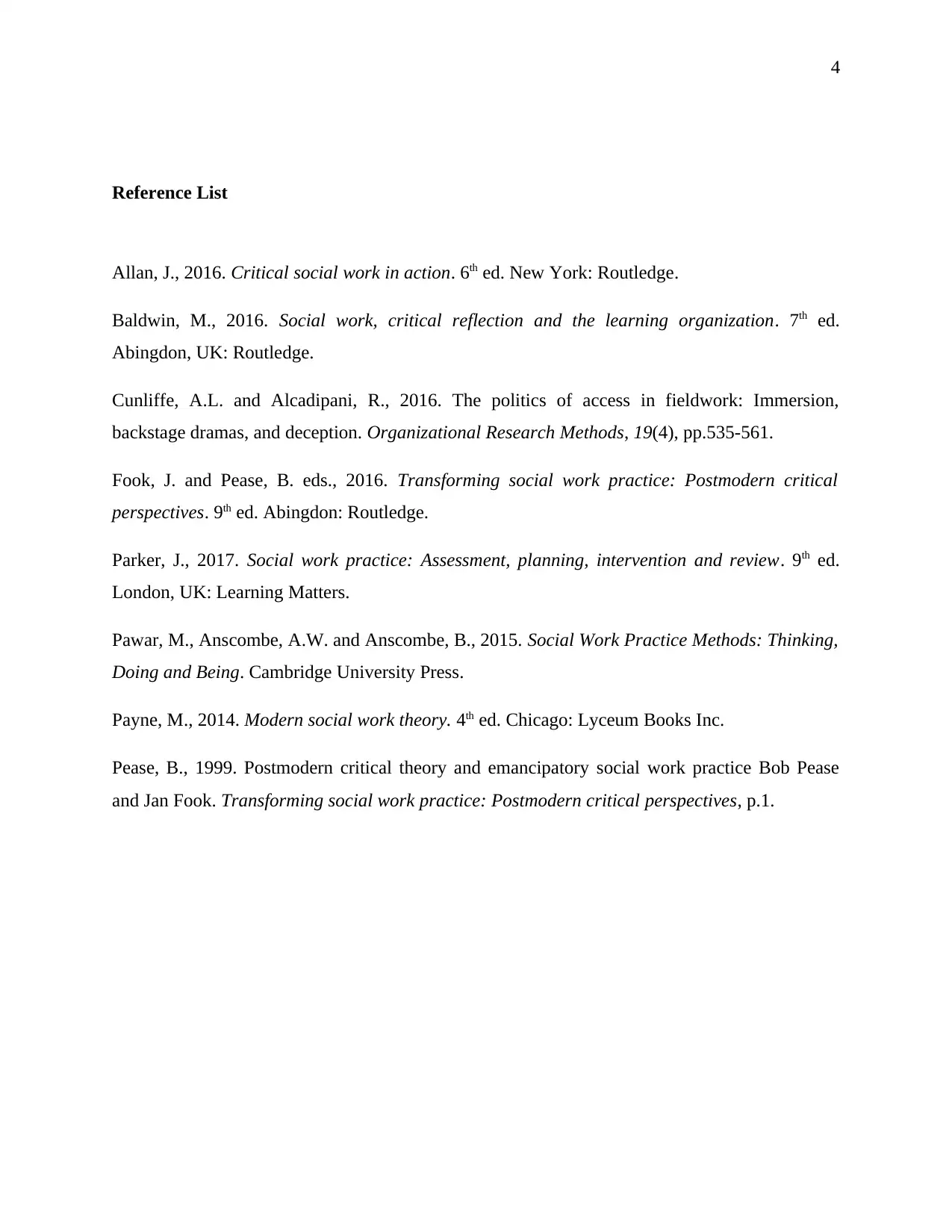SOWK910: Reflective Social Work Practice Report - Experiences
VerifiedAdded on 2023/04/11
|4
|924
|290
Report
AI Summary
This report examines the author's personal and professional experiences within the context of social work practice, specifically referencing the standards set by the Australian Association of Social Workers (AASW). The author reflects on their understanding of social work, its principles, and their experiences in healthcare and rehabilitation settings. The report compares these experiences with AASW standards, highlighting areas where the author's practice aligns and areas where further development is recommended. The author emphasizes the importance of ethical practice, theoretical knowledge, and the welfare of the community. The report concludes by underscoring the significance of maintaining social work practices that meet the Australian standards for the benefit of the community.

1
Social Work
Social Work
Paraphrase This Document
Need a fresh take? Get an instant paraphrase of this document with our AI Paraphraser

2
Introduction
The Australian social practices have been designed to frame the anticipations of performing
social works from all the social workers practicing in Australia (Baldwin, 2016). They are
framed to provide the rules and regulations of all the social work practices which aim to achieve
the need of practice as set out in the rules of Australian practices (Pawar, Anscombe &
Anscombe, 2015). For this purpose, the Australian Association of Social Workers (AASW) was
formed, back in 1954, creating the standards and the ethics of the performance of diverse kinds
of work. The practices of a social worker is a commitment to towards the welfare of the
community at large (Allan, 2016). These social practices aggravate the smooth functioning of the
work and establish the standards which future generation of the workers are bound to follow
(Parker, 2017). In the wider sense, the Australian social practices are for the benefits of the
human rights and social justice. The aim of the report is to establish the personal and the
professional experiences and compare the standards of the social work practice.
Personal and Professional experiences
In the report, I have understood the meaning of social work and its importance. Social work
implies upon the basis of regular practice and a strict discipline which targets towards the
development of the alterations in the society and in the welfare of the community (Fook & Pease,
2016). I know that social services include the various principles of social work and sciences. I
have come across the origin of social work which provides me with the basic idea of the
functionalism of the society. The overview of the Australian Social work includes the steady
development of the profession, the worldwide recognition of the researchers and the
practitioners, curbing of poverty and unemployment, racism and discrimination based on sex
(Cunliffe & Alcadipani, 2016). I have gained personal and professional experience and I can
compare it with the social work standards as well.
I have gathered professional and personal experience in healthcare practices. I participated in
helping doctors and nurses to serve the victims in the medical camps. The victims were poor and
did not possess the adequate means to suffice their treatment. Helping and serving them has
given a new dimension for the welfare of the people. From the aspect of professionalism, it is
important to promote the welfare of common mass in every possible way with ethics and
Introduction
The Australian social practices have been designed to frame the anticipations of performing
social works from all the social workers practicing in Australia (Baldwin, 2016). They are
framed to provide the rules and regulations of all the social work practices which aim to achieve
the need of practice as set out in the rules of Australian practices (Pawar, Anscombe &
Anscombe, 2015). For this purpose, the Australian Association of Social Workers (AASW) was
formed, back in 1954, creating the standards and the ethics of the performance of diverse kinds
of work. The practices of a social worker is a commitment to towards the welfare of the
community at large (Allan, 2016). These social practices aggravate the smooth functioning of the
work and establish the standards which future generation of the workers are bound to follow
(Parker, 2017). In the wider sense, the Australian social practices are for the benefits of the
human rights and social justice. The aim of the report is to establish the personal and the
professional experiences and compare the standards of the social work practice.
Personal and Professional experiences
In the report, I have understood the meaning of social work and its importance. Social work
implies upon the basis of regular practice and a strict discipline which targets towards the
development of the alterations in the society and in the welfare of the community (Fook & Pease,
2016). I know that social services include the various principles of social work and sciences. I
have come across the origin of social work which provides me with the basic idea of the
functionalism of the society. The overview of the Australian Social work includes the steady
development of the profession, the worldwide recognition of the researchers and the
practitioners, curbing of poverty and unemployment, racism and discrimination based on sex
(Cunliffe & Alcadipani, 2016). I have gained personal and professional experience and I can
compare it with the social work standards as well.
I have gathered professional and personal experience in healthcare practices. I participated in
helping doctors and nurses to serve the victims in the medical camps. The victims were poor and
did not possess the adequate means to suffice their treatment. Helping and serving them has
given a new dimension for the welfare of the people. From the aspect of professionalism, it is
important to promote the welfare of common mass in every possible way with ethics and

3
professional knowledge (Pease, 1999). I have gained adequate knowledge with regard to the
theoretical approaches, which would be fruitful during my professionalism. I have gained
professional work experience while working in a rehab which aimed at giving a new life to the
drug addicts and people suffering from alcohol abuse. One important theory is the Bowlby’s
Attachment Theory, which signifies the professional behavior with the clients. There are also
phases where the standards and the demands of the clients have to be met with (Payne, 2014).
The youth homelessness in the rehabs, were benefitted in a big way. I can make the comparison
with social work standards. Upon comparing, the first point includes the applicability of the
knowledge to the required sectors. This incorporates under itself, the importance of Awareness
creation, maintenance of balance and enabling the connection between each other. Despite the
negative effects, I have always wanted to practice social work because the benefit of the society
always attracted me.
Recommendations
After going through the comparison between the practices, there are standards which are met
with and which are not met. For the standards which are not met with, I recommend that subtle
knowledge and awareness should be created in that subject. This would enable a better way of
approach towards the working of the standards of social work. To add to this, it is important to
understand why the social work is done. Hence, it is important to focus upon the reason of social
work practice and work for the benefit of it. There should be consistent monitoring and
supervision of the performances of the tasks and to see that the Australian social work practice
standards are met with.
Conclusion
After a close perusal of the above report, it can be concluded that it is very important to maintain
the social work practice methods at par with the standards of the Australian Work Practice. It is
an important criteria to meet with all the standards which are necessary to curb the non standard
practices and practice those ways which are ethical. To add to this, the social work practices are
always for the benefit of the community at large. Hence, it holds pivotal importance to maintain
these standards.
professional knowledge (Pease, 1999). I have gained adequate knowledge with regard to the
theoretical approaches, which would be fruitful during my professionalism. I have gained
professional work experience while working in a rehab which aimed at giving a new life to the
drug addicts and people suffering from alcohol abuse. One important theory is the Bowlby’s
Attachment Theory, which signifies the professional behavior with the clients. There are also
phases where the standards and the demands of the clients have to be met with (Payne, 2014).
The youth homelessness in the rehabs, were benefitted in a big way. I can make the comparison
with social work standards. Upon comparing, the first point includes the applicability of the
knowledge to the required sectors. This incorporates under itself, the importance of Awareness
creation, maintenance of balance and enabling the connection between each other. Despite the
negative effects, I have always wanted to practice social work because the benefit of the society
always attracted me.
Recommendations
After going through the comparison between the practices, there are standards which are met
with and which are not met. For the standards which are not met with, I recommend that subtle
knowledge and awareness should be created in that subject. This would enable a better way of
approach towards the working of the standards of social work. To add to this, it is important to
understand why the social work is done. Hence, it is important to focus upon the reason of social
work practice and work for the benefit of it. There should be consistent monitoring and
supervision of the performances of the tasks and to see that the Australian social work practice
standards are met with.
Conclusion
After a close perusal of the above report, it can be concluded that it is very important to maintain
the social work practice methods at par with the standards of the Australian Work Practice. It is
an important criteria to meet with all the standards which are necessary to curb the non standard
practices and practice those ways which are ethical. To add to this, the social work practices are
always for the benefit of the community at large. Hence, it holds pivotal importance to maintain
these standards.
⊘ This is a preview!⊘
Do you want full access?
Subscribe today to unlock all pages.

Trusted by 1+ million students worldwide

4
Reference List
Allan, J., 2016. Critical social work in action. 6th ed. New York: Routledge.
Baldwin, M., 2016. Social work, critical reflection and the learning organization. 7th ed.
Abingdon, UK: Routledge.
Cunliffe, A.L. and Alcadipani, R., 2016. The politics of access in fieldwork: Immersion,
backstage dramas, and deception. Organizational Research Methods, 19(4), pp.535-561.
Fook, J. and Pease, B. eds., 2016. Transforming social work practice: Postmodern critical
perspectives. 9th ed. Abingdon: Routledge.
Parker, J., 2017. Social work practice: Assessment, planning, intervention and review. 9th ed.
London, UK: Learning Matters.
Pawar, M., Anscombe, A.W. and Anscombe, B., 2015. Social Work Practice Methods: Thinking,
Doing and Being. Cambridge University Press.
Payne, M., 2014. Modern social work theory. 4th ed. Chicago: Lyceum Books Inc.
Pease, B., 1999. Postmodern critical theory and emancipatory social work practice Bob Pease
and Jan Fook. Transforming social work practice: Postmodern critical perspectives, p.1.
Reference List
Allan, J., 2016. Critical social work in action. 6th ed. New York: Routledge.
Baldwin, M., 2016. Social work, critical reflection and the learning organization. 7th ed.
Abingdon, UK: Routledge.
Cunliffe, A.L. and Alcadipani, R., 2016. The politics of access in fieldwork: Immersion,
backstage dramas, and deception. Organizational Research Methods, 19(4), pp.535-561.
Fook, J. and Pease, B. eds., 2016. Transforming social work practice: Postmodern critical
perspectives. 9th ed. Abingdon: Routledge.
Parker, J., 2017. Social work practice: Assessment, planning, intervention and review. 9th ed.
London, UK: Learning Matters.
Pawar, M., Anscombe, A.W. and Anscombe, B., 2015. Social Work Practice Methods: Thinking,
Doing and Being. Cambridge University Press.
Payne, M., 2014. Modern social work theory. 4th ed. Chicago: Lyceum Books Inc.
Pease, B., 1999. Postmodern critical theory and emancipatory social work practice Bob Pease
and Jan Fook. Transforming social work practice: Postmodern critical perspectives, p.1.
1 out of 4
Related Documents
Your All-in-One AI-Powered Toolkit for Academic Success.
+13062052269
info@desklib.com
Available 24*7 on WhatsApp / Email
![[object Object]](/_next/static/media/star-bottom.7253800d.svg)
Unlock your academic potential
Copyright © 2020–2026 A2Z Services. All Rights Reserved. Developed and managed by ZUCOL.





